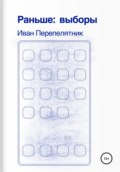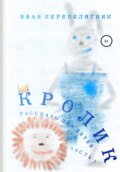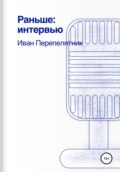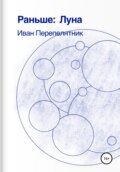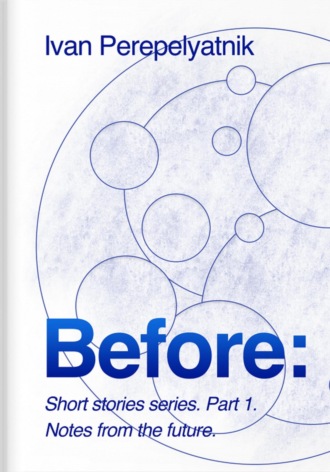
Иван Перепелятник
The Before Short Story Series. Part 1
It was in his editorial office that he felt himself most confident. The work occupied his whole life, and, in fact, it was his life. But on that day he was feeling a little tired and devastated.
There was a capsule waiting for Thomas outside the Bild house, ready to finally take him home, where Peter was waiting. He was looking forward to a family dinner and a chat about nothing. Those thoughts calmed him down, he felt more comfortable.
‘Enough for today. Home, home, home!’ Thomas muttered wearily as he sat down in the capsule.
The noise of city streets muffled, the sounds of a mountain river and the roll call of forest birds, +22 °C—all settings automatically turned on for the convenience and comfort of the passenger. ‘It will take no more than 10 minutes to get home’—a route to Thomas’ house in the suburbs of Munich was displayed on the monitor. The capsule silently raced along multilevel city highways, moving away from the business centre of the city, leaving behind its energetic bustle and competitive ultimate fight for the opportunity to be the best.
Important Details
The main station of Munich was located under the business centre of the city. In a twenty-million megalopolis it wasn’t easy to allocate land on the surface for such large-scale public centres. But, it wasn’t at all necessary in that particular case. International high-speed highways ran underground—a transport tunnels network covered the whole of Europe, similar to a multibranch metro in some major city before. One could have worked in Brussels, and lived in Berlin—to get to work, when of course the requirement for a personal presence was implied, took no more time than a subway ride to a station in the opposite part of the city.
The station seemed to be absolutely stretched in size. Endless series of shops, restaurants and small cafes, service centres for tourists, capsule hotels where one could recuperate before a business meeting—without detailed communicator navigation instructions one could have easily got lost in huge multilevel halls connected by numerous passages, travelators and elevators.
Munich Train Station like a big modern city, hidden underground, never slept, was always on the move. Despite all the scope and complexity, the architects tried to make it cozy at the same time.
There was a long row of restaurants along the perimeter of one of the central halls after the Parisian fashion. Tables and burgundy sunshades, decorative parasols carried the ever-hurrying travellers to the French capital in lunch time. Complementing the theme of Paris, each of the five main halls of the station demonstrated its central individual idea, a concept emphasizing the unity of European capitals.
The tourist bustle of London’s Regent Street with its cavalcade of magnificent shops; the masterpieces of the Moscow Tretyakov Gallery and Saint Petersburg’s Hermitage—paintings on huge screens, graciously offered themselves to be viewed; the proud grandeur of Rome, which confidently took its place in the first row of architectural masterpieces of the ancient world; the riot of Berlin’s modern art, balanced by the monumental structure of the Brandenburg Gate—Europe’s largest logistics centre in Munich provided vivid impressions for more than two hundred million passengers, forever fitting into family albums with memories of trips around the world. Over the past seven years, the station had ranked first among the most popular transport hubs in the world. Thomas’ favourite hall was the main and the largest, the Berlin Hall. The high ceiling vaults decorated in Gothic style, combined with the contemporary modern design of shops and cafés, with graffiti, somewhere littered with cardboard and wooden boxes, symbolizing the protest mood of young people, did not contrast at all with each other. On the contrary, the deliberate mix of design elements emphasized how important it was for the creators to show the connection between generations and time, respect for the history of the city and its culture. The light, almost white arch of the main hall of the station was supported by thin columns made of metal, like thin stems overlapping each other in a reed bush. Each group of such supports contained three to ten rods. This approach made it possible to further increase the perception of the total volumetric dimensions of the hall without concealing its space.
A team of three Bild employees led by Thomas Bach gathered in a cafe waiting for the shuttle to depart for Moscow. Peter Weichner, as Thomas’ personal assistant, held responsibility for the entire organizational and administrative part, allowing the main actors to focus at the task itself— to prepare another bright and interesting interview to be of interest for millions of subscribers and technology geeks around the world. One hundred and twelve million views was Thomas’ record. A report on the launch of an ITER-type installation in Germany and networking it to the Pan-European power grid was released more than 50 years ago. Since then, they had worked with Anna together. Anna Neichuk had received more than one professional award as a high-class camera operator.
‘Do you remember, friends’, Thomas turned to his colleagues, sipping from a small cup of espresso, affectedly cocking his chubby little finger, ‘what is our goal for today?’
‘Of course, Thomath!’ Peter readily responded lisping. ‘To shoot a lethal material that will allow uth to break through the theiling of the Bild chartth.’
‘That’s right, my dear!’ Thomas did not hide his relationship with a colleague in a narrow circle, but would not emphasize it either. ‘The task is extremely simple—I want one billion views!’
Anna gave a little whistle:
‘Yeah, there’s only one little thing left. The plot is wonderful. As in my opinion, with good potential. I don’t think, of course, that we will gain one billion. This is rather the prerogative of stories about the illegitimate offspring of the Pope or the murder of the chancellor. But there is a chance to break the previous record. However, let’s be realistic, guys—the chance is not that big. And granted that you, Thomas, will be your best, as usual.’
‘How funny this chubby finger of his sticks out,’ Anna smiled, restraining herself.
‘D’you remember it ever being different, my friends! Our team of professionals has always demonstrated a distinctive approach and remarkable results! We weren’t always lucky with themes. That’s true,’ Thomas sighed heavily. ‘But this time, I feel, everything will work out in the best way possible!’
‘Our shuttle leaves in 15 minutes,’ Peter addressed his colleagues. ‘It’s time to move out.’
The bulky luggage of the journalists’ team was delivered to the station in advance, checked by automated security services and loaded into the appropriate compartment of the shuttle. They had only to walk light to the right terminal, find the gate and wait for departure.
‘Travel! I love travelling!’ Anna was quite interested while looking at the surprisingly bright, colourful design of shop windows on the way to the boarding gate, at tourists and businessmen, busy station employees, and information desks. ‘Everything is so lively and gorgeous here! There is no need to go anywhere—just look around and enjoy the local sights!’
‘I thee, you are feeling great this morning! Peter replied. ‘To tell the truth, I’d rather have a couple of hours of thleep more. No lethth.’ And added ‘these are mostly exampleth of workth by modernithtth, I would have thought, from Berlin gallerieth. I do recognithe thome.’
Thomas waddled along, slightly ahead of Peter and Anna. When they reached the entrance to the shuttle, Peter started bustling around:
‘We need to take a photo and shoot a couple of frameth.’
‘Okay, let’s do it,’ Thomas responded. ‘One photo of us all together, the second is just me. Anna, and take a picture of me entering the shuttle.’
Anna took out a mini photodron from her backpack. Having checked the settings on the
communicator, Anna replied:
‘Everything is ready. Come up closer. The light is optimal for photos here.’
The team looked really great against the background of the bright blue metal body of the shuttle with a silver arrow piercing it from the very head to the end. The shuttle was a solid structure no longer than 70 meters. A huge turbine in its head part provided reduction of the air density at the front and in the immediate vicinity of the head part. This was one of the critical components of the system, making it possible to reach a speed limit of 1000 km/h.
Superconducting magnets of a new generation, operating at normal room temperature, made compensation for contact friction during the movement of the shuttle unnecessary too—the body of the vehicle did not come into contact with anything other than rarefied air. It levitated.
It was frequently, hundreds of times that Thomas was travelling by shuttles in different parts of the world.
Each of these trips did not cause him just a feeling of childish unrestrained delight. Born at the time when the speed of the most advanced ground vehicles did not exceed half of what the main underground system offered at present, he understood an extent of the powerful economic potential that the new infrastructure would allow to realise. He was fascinated by the possibilities of cooperation and interaction between artificial and human intelligence, at the same time frightening him to a piercing cold sweat in the middle of the night, when he would woke up from another nightmare fantasy in the fashion of universal armageddon. Thomas could navigate in the current trends of technological development well enough, and he was frightened by the prospects and potential of the possibilities of the PAX quantum system.
A widespread automation of work processes, and not only mechanical or implying low-intellectual operations, was increasingly pushing people to the sidelines of economic relations. Of course, overall performance in most applications would be higher than human performance. True, people adapted, developed professionally, focused on more complex tasks involving a creative approach with each generation to come, but the pressure of AI was only increasing. Thomas could hardly feel at all himself being overwhelmed by these fears. As an expert in the technological field, it would have seemed right for him to be at the forefront of the advocates of the new order of things. And he was such an icon and a herald for everyone. At the same time his inner voice was getting its own way.
In line with the Bild corporate regulations, where one of the key rules was—Confidentiality. Confidentiality. Confidentiality– the media holding considered it reasonable for its employees to travel on business in individual multi-seat compartments when going by underground shuttles or airplanes, although such precautions were much more expensive compared with the cost of even the first class. Information leaks already result in multimillion losses to the company every year. I will not save on several hundred thousand euros to lose even more—editor-in-chief Jasha Kapra
used to say defending an unreasonable expense item in front Bild auditors.
Next to the entrance to the Thomas’s team compartment, on the information screen current speed and point on the general route were displayed in rapid succession.
They just managed to leave the train station, not even a couple of minutes had passed—400, 450, 500 km/h… ‘No wonder,’ Thomas thought, ‘considering that in two and a half hours we should already be in Moscow.’
‘Peter, well, what did you find on our star? Would you share your insider information,’ Thomas asked the assistant, taking his computer out of the bag.
Peter and Anna were sitting opposite Thomas at the table, where it was convenient to do some paperwork or view news feeds from information agencies on a tablet. The design of the shuttle did not imply the necessity of passenger windows—the train was moving in underground tunnels, and any structural additions affecting the integrity and rigidity of its body did not offer benefits for reaching high speed. There was a large panel mounted on the compartment wall facing the passengers for for their entertainment and leisure. It was possible to choose anything to one’s personal preference: from news channels to car simulators, where it was possible to measure virtual driving skills with fellow travellers. Peter switched on his tablet, displayed information from it to the panel for greater convenience of the colleagues, and began telling the story.
‘Alexandra Tokareva. 53 years old. Liveth with a friend in Moscow. She graduated with honors from two of the best universities in the world—the Novothibirthk Univerthity in Russia and MIT in the U.S. In the scientific community, she hath a reputation as a high-clathth specialitht. She patented a number of inventionth in the field of big data analythith’—Alexandra’s photos from various scientific events, short videos with her speeches at conferences were displayed on the screen. ‘Well, Thomas, you’ve already read and theen all this.’
‘Of course, I’ve read it. Dee gathered this information for me without much difficulty. D’you have anything I don’t know, Peter?’
‘I think, yea.’
An image of two elderly people appeared on the screen—a man and a woman. Judging by the surroundings, the photo was old and taken a long time ago.
‘These are Tokareva’s parents. I do not know why, what the reason was, but they died before reaching even 100 years old,’ Peter looked at Thomas appraisingly, hoping to see, if not surprise on his face, then at least approval of such an important find.
‘That’s interesting.’
‘Ha! Of course! But it’s not all yet!’ Peter continued. ‘Apperently, her parents were divergents. The family moved to Novothibirthk just before Alexandra entered the univerthity. And where from would you think!?’ Peter theatrically froze waiting for an answer.
‘Well, where from then?’ Anna replied.
‘From Irkutthk! Irkutthk is far beyond the Uralth. There’th altho a famouth lake there. The world’s largetht lake with fresh water… uh, what’th the name…’
‘Baikal. I know where Irkutsk is. Don’t forget, dear comrades, I’ve studied in Russia for seven years. So you’re saying, Peter,’ Thomas continued, ‘that Alexandra’s parents lived in Cheremkhovo near Irkutsk in the centre of divergents?
‘That’th right!’
‘Great job, Peter! Well done, my dear!’
‘And it’th not the end yet! Wait to applaud! She had a younger brother who went miththing even before the family moved to Novothibirthk. So, twenty years after his dithappearance, the body of a teenager under Irkutthk was identified according to the results of the DNA analythith—it wath Igor Tokarev, the miththing brother of our Alexandra! According to the invethtigation protocolth that I managed to find, he was killed. But the reathonth for thith murder and who, in fact, killed him are thtill unknown.’
‘That’s really the story you’ve dug up! I didn’t expect it, I have to admit. Very good!’ Thomas was showering compliments. ‘There is, however, one nuance. A significant detail to be noted. This story sounds more like a fascinating plot of a detective story, but not an introduction to a new interview technology allegedly developed by a young scientist in Moscow. As I said yesterday, I will quote myself: our task is to bring Tokareva to light. It’s good that we still have time to finalize the script and questions.’
‘In general, I’ll tell you, colleagues,’ Thomas continued, ‘times are different now, of course. When I was at the university, at Moscow State University, we had a different understanding of what an interview was. All the stages of taking an interview and making a report could have been compared to a great adventure: from careful preparation, direct communication with the client, to memoirs, if, of course, there was anything interesting to tell about in a book, Thomas smiled. ‘We didn’t have any digital assistants, capable of generating a plump dossier on the topic in a minute, covering all the possible aspects of the history under investigation. We actively used, but with reasonable caution, the Internet, as an endless source of information garbage fields, realising the need, even for self-protection, to very carefully sort, check and verify all the data extracted from it. No one wanted to get into a situation when, referring to a certain resource on the global web, which, in fact, was run by another socialite from the local zoo, or an Instagram blogger with 30 classmates-subscribers, you just reposted a tabloid fib.’
Anna interrupted Thomas:
‘What does the zoo have to do with it and who is Instagram, Thomas? What kind of web?’
‘The global Web—that’s what the Internet was also called when I was a student. And it’s not so important, my dears. The point is that journalism used to be quite different—the job was risky, complicated, performed an important social function, challenged those in power… Have you ever heard such an expression—press is the fourth power?’
‘No, Thomath, I haven’t heard that,’ Peter replied.
‘No surprise. Since now we have all the branches of governmental power eventually flocking to a single point of concentration of all and everything.’
‘And what ith thith point, Thomath?
‘The PAX, of course. The fucking PAX. But what matters today Peter, is that you’ve found this important information that Dee didn’t give out. I won’t ask you how and where you got it from, my dear.’
A steward brought three cups of coffee ordered by Peter, who was beaming with his own journalistic luck.
‘I must admit that luck really helped him,’ Thomas reflected. ‘This family drama with the murdered boy should be carefully considered and brought up in the conversation with Alexandra.’
Thomas looked at the information screen, displaying the current status of the trip:
‘Speed: 989 km/h.
Travel time to Moscow: 1 hour 30 minutes.’
All as planned
Rocking in an armchair with a large cup of strong coffee in his hands, Sergey Semyonovich
was following the established routine of many years of service—looking through reports, orders, sorting mail on the computer. In the office there was an aroma of freshly ground invigorating drink with light notes of tobacco.
A man of the old school, as he often would describe himself, Sergey Semyonovich never found the strength to quit smoking, although he switched to completely harmless cigarettes, as his wife assured him. ‘Seryozha, well, if you go on poisoning yourself, please think about your grandchildren—they are not to blame for anything!’ He couldn’t have ignored that argument. Finally giving up, at the age of 167, he had to change his habit, which he treasured so much. In the old classical manner (or, as he said, culture) of smoking, Sergey Semyonovich found a connection with the past era, for which, as a man no longer young, he sometimes felt nostalgic.
Informational message.
August 12, 2153.
For attention: Zhdanets Sergey Semyonovich,
Head of Department for Emergency Situations
Category: Red.
On August 7, 2153, corporate employees of the Bild publishing house (please see the list of names in the appendix) contacted Alexandra Iosifovna Tokareva about organizing a meeting in Moscow at the Moscow State University laboratory.
Background information on the case.
Alexandra Iosifovna Tokareva.
Gender: Female.
Age: 53 years old.
Place of residence: Moscow.
Place of work: Moscow State University, Laboratory of Macro Data Processing and Structuring, Senior Researcher.
Tokareva is a recognised expert in the field of big data analysis.
Tokareva has been involved in a number of state programs for the development of regional infrastructure projects.
For additional personal data, please see the appendix.
Case Summary.
In May 2153, the MSU laboratory, where Tokareva is employed, completed the development of a prototype of the Interview software package (the working title of the project), designed to generate visual and speech images according to the specified parameters of the individual with the help of the PAX quantum computing power, images that at the time of the formation of the corresponding projection have not presented an active registered civil society object and/or that of military divisions.
The PAX system cluster, supervised by the security services of Russia, classifies the current situation as Red and recommends preventing meetings between Bild journalists and Alexandra Iosifovna Tokareva for an interview on the issue of clarifying the fundamental principles of the prototype of the Interview software package.
Executed by: Vladimir Igorevich Murashkin,
2nd rank officer, Event Monitoring Department.
Sergey Semyonovich opened his department operational comms app: ‘Murashkin, Murashkin… where are you, Murashkin…’
‘Vlad, come to my office regarding your report on Tokareva.’
‘Good afternoon, Sergey Semyonovich. I’ll be right there,’ Vladimir answered over the speakerphone.
‘So what is this story, Vlad, please clarify,’ inviting him to take a seat opposite his desk, Sergey Semyonovich addressed his subordinate. ‘You’ve intrigued me. What can this Tokareva’s software complex do?’
‘Sergey Semyonovich, the PAX and we ourselves try to do the job in the best possible way, tracking all significant events. Those causing certain concerns are the first to be subject to a thorough analysis.’
‘Vlad, well, you… you did everything right—your report is to the point and straightforward. Now I need to figure out what kind of technology, what kind of risks, what the options are. These are the issues that are important now.’
‘Understood, Sergey Semyonovich. So, this is the case. This lengthy and confusing name of Tokareva’s new development—Prototype of the Interview software package for generating a visual and speech image according to the specified parameters of the individual who is not an active registered object at the time of the formation of the corresponding projection…’—implies the possibility of creating a digital copy of the person who no longer exists, a survey and a dialogue with this prototype.
It was like for a moment everything went frozen in the office.
‘What does that mean? Please explain, Vladimir,’ the boss said quietly, pulling up the chair closer to the table.
‘To say in fact and briefly, Sergey Semyonovich…’
‘Yes, Vlad, in fact and briefly.’
‘We are dealing here with a possibility of feeding digitized data about a deceased person to the system: photos, videos, information from social networks, medical data, data from state databases, including audio and video surveillance systems, and the like. All this digital data is digested by PAX, based on the algorithm developed by Tokareva and her team, and as the output we get the opportunity to fully communicate online with a digital projection, a digitized copy of the person from the past—someone who no longer exists.’
‘Yeah, let’s assume it’s clear,’ Sergey Semyonovich leaned back in his chair. ‘And does this voodoo technology work?’
‘According to the reviews and comments of Tokareva’s colleagues, which we collected online the other day based on the signal received from PAX, the answer is positive—yes, it works. Tokareva herself notes that at the current stage we can only talk about a prototype or only an early version of the emulation of the individual program, as she herself calls it. Her colleagues note, Sergey Semyonovich, that, despite the early stage of the work on this software model, the reliability of the resulting personality projection is high and reaches 80-85% accuracy.’
‘Really?! And how did they calculate it? How was it measured, would be interesting to know?’
‘They did surveys, starting with 100% reliable facts of the person’s biography, and up to the events to which the person was related, but which were not recorded anywhere. For example, some family events, work situations, and the like, that only family members or colleagues would know about. Thus, we can conclude that this prototype is already working and is a highly important tool and asset,’ Vladimir summed up.
‘Fine. That’s clear, Vlad. When is their meeting scheduled for—Bild and Tokareva?’
‘On August 19, Sergey Semyonovich. Here, in Moscow, in a week.’
‘Good. So, let’s do as follows. (1) I confirm the PAX recommendations regarding the inexpediency of a meeting between the German journalists and Tokareva. (2) It is necessary to develop a set of measures to keep safe the developed prototype and maximize the support of the laboratory, Tokareva and her team. (3) My first priority is to report this situation to Ilya Igorevich and coordinate our further actions. Please keep in mind, Vladimir,’ Sergey Semyonovich significantly pointed in Vladimir’s direction with his index finger,’—the red priority issue. All right then, let’s do it 100% accurately.’
‘There we are then! My God! Soon they will digitize us alive, so that’s the way it goes…’, having agreed the possibility of an urgent meeting to report the director of the PAX security service, Sergey Semyonovich started getting ready to go.
Interview about the Interview
‘So, Alexandra, apparently, you and I have succeeded after all!’ Thomas greeted the other party.
‘Apparently, yes, Thomas! Good afternoon!’ Smiling, Alexandra held out her hand to greet him.
A special Bild room for virtual interviews did not require any particular preparation from the participants. One only needed glasses and a tablet with a camera in front of the conversation partner. The computer did the rest of the work. The participants of the conversation saw and felt themselves located in a modern meeting room in the Bild building in Munich on the 47th floor of the editorial office. At the same time, they themselves could have been anywhere, even on the beach, and if one wanted to chat while relaxing with friends in the forest, you were welcome. Those taking part in the conversation, and the viewer would all see a perfectly realistic picture of the event with the personal presence of the participants in the Bild office.
‘I am glad that you could find an opportunity to meet with me and talk about your amazing, stunning and mind-blowing program, the Interview—so much it is now praised by the media around the world! But first of all, of course, I want to congratulate you, Alexandra, on this success. What you and your team have done is like a revolution in our world. A new stage in the development of society. Important historical events and the stories of people whom we honour or, on the contrary, would like to forget as soon as possible—everything will appear to us in a new way. All the hidden details and secrets will be carefully studied, myths and tall tales will be finally debunked.’
Alexandra started laughing:
‘If only it were the case, Thomas. But thanks. The team has done a lot of work. And I have something to thank each of our specialists for. This is indisputable.’
‘Alexandra, before we move on to the amazing details of your development, let me clarify why our first meeting, scheduled for mid-August, two months ago, failed? What was the reason for such an unexpected withdrawal of your invitation to our editorial office to meet with you in Moscow at the specialized research laboratory of Moscow State University?’
‘Of course, Thomas, I’m ready to explain everything to you. The reason is simple and purely technical. Our laboratory at Moscow State University,’ Alexandra emphasized State, ‘falls under certain regulations of the state security system, which is constantly monitored by PAX. Given the field of our research, such a security barrier, if you will, seems reasonable and appropriate.
Our laboratory participates in the strategy development for important and critical infrastructure projects in the country, in Russia, which, of course, attracts attention of various organizations, both commercial and some international services. We understand the wish of the Russian security agencies to take care of us and our work. As they explained us, some restrictions that were indeed applied to the meeting with Bild journalists scheduled for August—the circumstances in which we had found ourselves, were determined by PAX.’
‘Don’t you think this explanation to be convenient—referring to a certain system? Like, the system is in charge of everything.’
‘It sounds like that, Thomas,’ Alexandra continued, slightly adjusting her glasses, ‘but this situation is as real as our conversation with you at the moment. You are in Munich, I am in Tel Aviv, but for the viewers of your channel, we both are in your office. This is how they see and perceive this particular event. PAX assigned a high priority risk in relation to the integrity and information security of a rather complex intellectual product, with large funds invested in its development— the relevant services could not help but react to this. That’s the whole story. I am ready to apologize to you once again that our meeting did not take place then in August. But I hope that your trip to Moscow was not in vain, and you managed to spend a few productive and pleasant hours in the city.’
Alexandra made it clear that she was not ready to go into the details of the story. The case was closed. Thomas decided that it would be inappropriate to go into further investigation of the reasons for the cancellation of the agreed interview. That day in Moscow they managed to talk with the world legend of biohacking, Dr. Albina Zemtsova, who was at the origin of the development of digital passports. An old friend of Tokareva, having learned that the meeting with her would not take place, she contacted Thomas’ team herself and offered to talk about some new developments in her laboratory. The material turned out to be excellent, and based on it, the editorial board decided to launch a series about the development of a Tracker.
‘Alexandra, so how does it work anyway?’
‘I think that both you, Thomas, and the audience have already heard about the basic principle of the Interview software package. Nevertheless, to briefly describe its essence in a nutshell, I will note the following. Based on big data about human life, about all its aspects—from physical, so to speak, parameters and character traits, social activity, a wide range of available media materials…—based on the set of information about the personality under study, a digital copy of which we want to recreate, an appropriate model of the individual is built. There are, of course, countless components. This is one of the main problems—there should be so much information about the object under study that the range of possible candidates in the initial position would be extremely limited.



